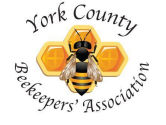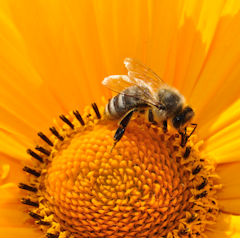YCBA Guild
The York County Guild Program is an educational and public service action plan devised and administered by the York County Beekeepers’ Association and is designed to promote good beekeeping practices and the accurate dissemination of knowledge in the public forum.
Objectives
- To provide a structured, multi-level, ongoing program by which members of the York County Beekeepers’ Association can improve both their knowledge of and their skills in managing honey bees.
- To recognize differing levels of competence, knowledge, and achievement of YCBA members on a voluntary, participatory basis.
- To recognize Master beekeepers of the York County Beekeepers' Association.
- To advance the accurate dissemination of information about honey bees in York County.
- To encourage beekeepers to become actively involved in their communities by sharing with the larger public information on the importance of honey bees and the rewards of beekeeping.
Administration
The program is administered by a YCBA Guild Panel consisting of three current members of the YCBA appointed by the President.
The panelists shall oversee the program, making any changes necessary to fulfill the objectives stated above or to maintain the integrity of the program, and shall assess applications from YCBA members for an entering accreditation level or progress to the next level of accreditation.
Participation
- Any current member of the York County Beekeepers Association is eligible to participate in this program, irrespective of age or experience.
- There is no cost to participate in the program.
- Participants with previous beekeeping experience may apply to enter at a specific level of accreditation.
- The responsibility rests with each applicant, to describe in writing why he/she meets all the criteria for a level of application with the necessary evidence attached where relevant.
- Applications for accreditation must be submitted by August 31st of each year. The address for such applications will be published on the YCBA website.
- In the event an application is declined the applicant will be informed of the reason and given direction as to how to fulfill the necessary criteria.
- The results of all applications shall be made available by the annual banquet in October and will appear on the YCBA website.
Current Guild Members:
- Apprentice - Richard & Linda Janosky, Michael Rhodes, Michele Yeagy
- Journeyman - Ted Bell, Cecilia Berkstresser, Kathy Firestone, Bryan Flohr, Val & Dimps Hawthorn, Skip Missimer, Nathan Pears, John Shaffer,
- Craftsman - Gary Anderson, Mark Chronister, Robert and Anastasia Denoncourt
- Master - Tiffany Ayres, Jeremy Barnes, Mark Gingrich, David Papke
Levels of Accreditation
BASE REQUIREMENTS
- The applicant's apiary is registered with the PSDA.
- The applicant is familiar with the PSBA Best Management Practices.
APPRENTICE
Has kept bees for at least a minimum of one year and successfully over-wintered at least one colony.
Is familiar with beekeeping basics, eg. he/she can:
- Describe the parts of a bee hive.
- Identify the different castes of bees (queen, worker and drone).
- Identify different stages of brood development (egg, larva and pupa).
- Identify and differentiate between capped and uncapped brood, pollen, nectar and honey.
- Recognize propolis.
- Describe the layout of a brood nest.
Is familiar with the components of a Langstroth hive, including the concept of bee space.
Understands the criteria in establishing an apiary, e.g.
- The requirements of the PSBA Best Management Practices.
- Relevant local ordinances.
- The positioning of individual hives for best honey bee health.
Has basic bee management skills, e.g.
- Ignite and use a smoker.
- Open, inspect and close a hive.
JOURNEYMAN
Has kept bees successfully and continually for a minimum of two years and been an Apprentice for at least one year.
Can explain the yearly life cycle of a colony: build up, reproduction, and resource accumulation.
Can identify the main pests in a colony (e.g. varroa nosema, small hive beetle, wax moth) and has a management plan for each.
Can identify local and seasonal nectar and pollen sources in York County and surrounds.
Can recognize royal jelly in both a queen and larva cell.
Can identify, know the origin of, and explain the value of propolis in the hive.
Has harvested and extracted a minimum of one super of honey.
Is familiar with at least two alternatives to a Langstroth hive, e.g. Warré, Top Bar, Observation, A-J.
Has completed one community credit (see end for examples of Community Credits).
CRAFTSMAN
Has kept bees successfully and continually for a minimum of three years and been a Journeyman for a minimum of one year.
Can recognize, describe, and explain the functions of the interior and exterior elements of honey bee anatomy- worker, drone and queen.
Is familiar with the different races of honey bees, especially Italian, Carniolan, Russian, Caucasian and some of the hybrids.
Can recognize Africanized behaviors in a colony and knows how to respond.
Is familiar with the concept of and can explain the functioning of Integral Pest Management (IPM).
Has successfully split hives to make nucs.
Has successfully raised queens from his/her over-wintered colonies.
Has kept records of hive management activities for at least a year.
Three credits completed and has attended a beekeeping conference, e.g. PSBA, EAS, Apimondia.
MASTER
Has kept bees successfully and continually for a minimum of five years and been a Craftsman for a minimum of two years.
Can correctly identify the health and well-being of a colony by inspecting one frame drawn from the upper brood chamber.
Can identify and recommend treatments for the major diseases of a colony (e.g. AFB, EFB, DWV, APV, IAPV, Chalkbrood, Sacbrood).
Is familiar with the different pheromones involved in a healthy colony and the role played by each.
Has successfully produced and prepared comb honey.
Is familiar with the equipment for and the process of trapping pollen.
Is familiar with the pros and cons of apitherapy using the products of a hive.
Has completed five community credits, and has completed one of the following:
- Made a presentation to a beekeeping audience.
- Has had an article published in a recognized beekeeping journal.
- Has organized and led a significant workshop for beekeepers.
- Has initiated some research into a significant area of honey bee management and/or behavior.
It is expected that Master Beekeepers will be willing and able to help other YCBA beekeepers achieve the Apprentice, Journeyman and Craftsman levels.
Examples of Community Credits
- Present a bee-related talk to a non-beekeeping group.
- Hold an office in a local beekeeping association.
- Give a bee talk and demonstration to a school group.
- Assist members of youth organizations (4-H, Scouts, etc.) with a bee-related project.
- Successfully mentor a new beekeeper through at least one complete year.
- Assist in the set up, maintenance and dismantling of a public beekeeping demonstration, e.g. a fair, festival, or similar public event.
- Provide and maintain a hive to pollinate a public space, e.g. in a garden, on a downtown roof-top.
- Establish and maintain an observation hive for a school, civic group, museum, etc.
Resources
The YCBA has a library of books and videos related to the honey bee, and any of the current Master Beekeepers can recommend one or two of the many books that are in print. There are also many resources online, e.g.:
BASE REQUIREMENTS
http://www.pastatebeekeepers.org/pdf/BestManagementPractices_032117.pdf (best management practices)
http://www.pastatebeekeepers.org/pdf/Zoning.pdf (zoning and ordinances)
http://www.pastatebeekeepers.org/pdf/paBeeLaw.pdf (PA Bee Law)
http://www.pastatebeekeepers.org/pdf/registration.pdf (Apiary Registration)
APPRENTICE
http://scmidstatebeekeepers.org/honeybeelifecycle.htm
Jamie Ellis : http://americanbeejournal.com/category/archived-columns/field-guide-to-beekeeping/
Randy Oliver : http://scientificbeekeeping.com/first-year-care-for-your-nuc/
JOURNEYMAN
http://www.heathmonthoney.com.au/bees/colony-life-cycle_1.htm
https://content.ces.ncsu.edu/managing-varroa-mites-in-honey-bee-colonies
https://www.youtube.com/watch?v=4bm3Y4t1NwQ
http://beekeeping.wikia.com/wiki/Diseases_of_the_honey_bee
For seasonal nectar and pollen sources in York County and surrounds, request info from This email address is being protected from spambots. You need JavaScript enabled to view it.
https://phys.org/news/2016-10-protein-queen-honeybees.html
https://www.wired.com/2015/09/royal-jelly-isnt-makes-queen-bee-queen-bee/ for the more scientific minded
https://www.buzzaboutbees.net/honey-bee-hives.html
http://www.bushfarms.com/beesobservationhives.htm
CRAFTSMAN
http://articles.extension.org/pages/21754/anatomy-of-the-honey-bee
http://scmidstatebeekeepers.org/anatomyphysiology.htm)
http://three-peaks.net/PDF/Races%20of%20Honey%20Bees%2001.pdf
https://agdev.anr.udel.edu/maarec/wp-content/uploads/2010/03/IPM_FOR_.PDF
http://beekeeping.wikia.com/wiki/Diseases_of_the_honey_bee
http://threeriversbeekeepers.com/documents/nuc_class/
MASTER
https://www.ncbi.nlm.nih.gov/books/NBK200983/ (an exhaustive study of honey bee pheromones)
https://honeybeesuite.com/honey-bee-pheromones-common-scents/
http://beekeeping.wikia.com/wiki/Diseases_of_the_honey_bee
https://www.holisticmd.org/treatments/apitherapy-homeopathic-bee-venom-therapy/
http://www.honeybeecentre.com/apitherapy#.WpBsMRPwZQY
http://www.beeculture.com/bee-venom-therapy/
https://sciencebasedmedicine.org/bee-venom-therapy-grassroots-medicine/


